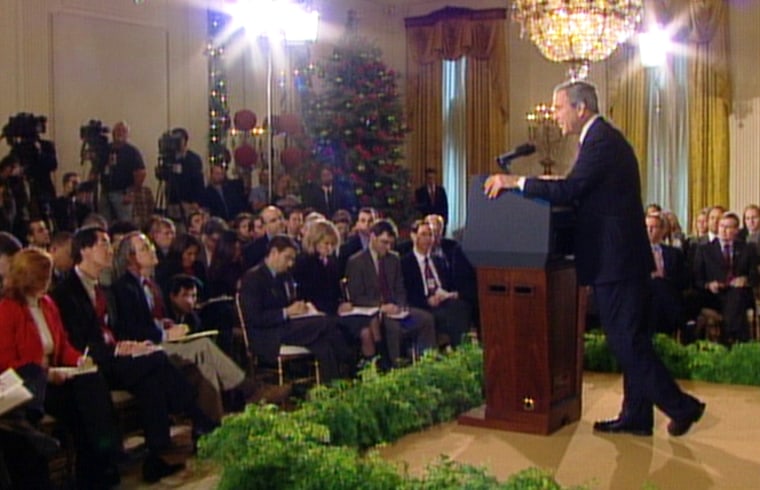President Bush on Monday said disclosure of his domestic eavesdropping program was a “shameful act” and said he will keep using it “for so long as the nation faces the continuing threat of an enemy that wants to kill American citizens.”
“As president of the United States and commander in chief I have the constitutional responsibility and the constitutional authority to protect our country,” he said in an opening statement at a year-end news conference.
Asked if the Justice Department would be investigating who leaked the existence of the program, first disclosed Friday by The New York Times, Bush said he presumed the process had started.
“It was a shameful act for someone to disclose this important program in a time of war. The fact that we’re discussing this program is helping the enemy,” he said at the White House event.
‘Legal to do so’
The spying program allows the National Security Agency to intercept the communications without court approval. A 1978 law, the Foreign Intelligence Surveillance Act, makes it illegal to spy on U.S. citizens in the United States without court approval.
Bush said he approved the action without such orders “because it enables us to move faster and quicker. We’ve got to be fast on our feet.
“It is legal to do so. I swore to uphold the laws. Legal authority is derived from the Constitution,” Bush added.
The existence of the program triggered an outpouring of criticism in Congress, but an unflinching defense from Bush and senior officials of his administration.
The president spoke not long after said Congress had given Bush authority to spy on suspected terrorists in this country in legislation passed after the attacks of Sept. 11, 2001.
Bush and other officials have said the program involves monitoring phone calls and e-mails of individuals in this country believed to be plotting with terrorists overseas. They have also emphasized that it only involves people suspected of being tied to al-Qaida and that one end of the communication has to be abroad.
Bush stressed that calls placed and received within the United States would be monitored as has long been the case, after an order is granted by a secret court under the provisions of the Foreign Intelligence Surveillance Act.
Bush bristled at the suggestion he was assuming unlimited powers.
“To say ‘unchecked power’ basically is ascribing some kind of dictatorial position to the president, which I strongly reject,” he said angrily in a finger-pointing answer. “I am doing what you expect me to do, and at the same time, safeguarding the civil liberties of the country.”
Despite Bush’s defense, there was a growing storm of criticism from Congress and calls for investigations, from Democrats and Republicans alike. West Virginia Sen. Jay Rockefeller, the top Democrat on the Senate Intelligence Committee, released a handwritten letter expressing concern to Vice President Dick Cheney after being briefed more than two years ago.
Rockefeller complained then that the information was so restricted he was “unable to fully evaluate, much less endorse these activities.” He registered concern about the administration’s direction on security, technology and surveillance issues.
Sen. Arlen Specter, R-Pa., chairman of the Judiciary Committee, said he would ask Bush’s Supreme Court nominee, Samuel Alito, his views of the president’s authority for spying without a warrant.
“Where does he find in the Constitution the authority to tap the wires and the phones of American citizens without any court oversight?” asked Sen. Carl Levin, D-Mich. Sen. Dianne Feinstein, D-Calif., said Bush’s interpretation of the Constitution was “incorrect and dangerous.”
Call for Patriot Act's renewal
Bush also called on Congress to renew the anti-terror Patriot Act before it expires at the end of the year. “In a war on terror we cannot afford to be without this law for a single moment,” he said.
The legislation has cleared the House but Senate Democrats have blocked final passage and its prospects are uncertain in the final days of the congressional session.
Raising his voice, Bush challenged Senate Democratic Leader Harry Reid and Sen. Hillary Rodham Clinton — without naming them — to allow a final vote on legislation renewing the anti-terror Patriot Act. “I want senators from New York or Los Angeles or Las Vegas to explain why these cities are safer” without the extension, he said.
Reid represents Nevada; Clinton is a New York senator, and both helped block passage of the legislation in the Senate last week.
“In a war on terror we cannot afford to be without this law for a single moment,” he said.
The news conference followed a in which the president asked that Americans “not give up on this fight for freedom.”
The news conference was the president’s 21st. The previous one was on Oct. 4.
The news conference ran just shy of an hour. It was the latest in a series of events — appearances outside Washington, meetings with members of Congress and an Oval Office address on Sunday night — in which the president has sought to quell criticism of the war in Iraq and reverse his months-long slide in the polls.
